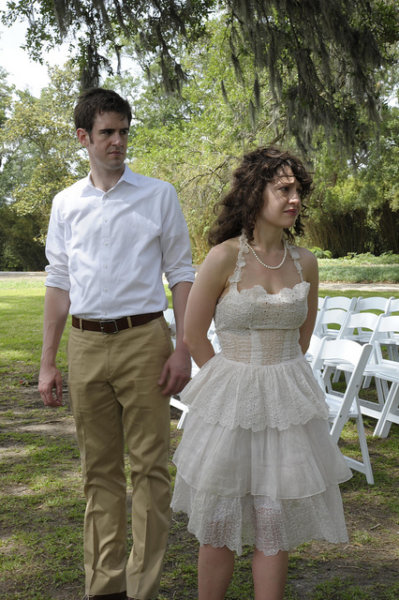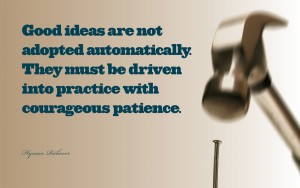Weddings and Depression – How to Beat the Wedding Bell Blues
 Weddings and depression are not two words you naturally put together. But the past few years have seen an increase in the number of newlyweds seeking help for a problem once rarely discussed – post wedding blues. No matter how great the love, how perfect the wedding day, or how blissful the honeymoon, depression sets in, and it can last weeks or even months.
Weddings and depression are not two words you naturally put together. But the past few years have seen an increase in the number of newlyweds seeking help for a problem once rarely discussed – post wedding blues. No matter how great the love, how perfect the wedding day, or how blissful the honeymoon, depression sets in, and it can last weeks or even months.
Post-Nuptial Depression (PND for short) isn’t just for “bridezillas”, either. Both women who keep the wedding hoopla to a minimum, couples who’ve nested happily together before marrying, and even grooms can find themselves ambushed by a barrage of unwelcome feelings.
According to a spokesperson from the British Association for Counselling and Psychotherapy, as many as one in ten women and a lesser number of men suffer from post nuptial depression, and the numbers are rising.
What are the signs of Post-Nuptial Depression?
Confusion: Looking forward to the wedding, you felt secure and content, chosen by fate for a happily-ever-after life. Yet now that it’s after, what happened to the happily? You don’t really know what’s wrong, but this isn’t what you signed up for.
 Guilt: Society and a thousand romantic movies suggest that marrying the person you love produces instant bliss. If this doesn’t happen, newlyweds feel they’ve done something wrong, and have gathered friends and exchanged vows under false pretences.
Guilt: Society and a thousand romantic movies suggest that marrying the person you love produces instant bliss. If this doesn’t happen, newlyweds feel they’ve done something wrong, and have gathered friends and exchanged vows under false pretences.
A feeling of emptiness when you think of your future: This is the most commonly expressed feeling of newlyweds with PND. After a year of looking forward to being married, suddenly, there’s no big event on the horizon. The next happy milestone of starting a family or buying a home may be some time in the future yet, and there’s a sense of let down when the day-to-day routine resumes.
Sense of loss: Your blues feel can almost like mourning. You miss the excitement of the engagement year, the announcing and planning, the social events and good wishes, even the fittings. You may also be mourning the loss of your old life, with its freedoms and options and familiar routines. You thought you’d never miss your single life, but now it glows with nostalgia, while your new life requires compromise and adjustment.
Financial remorse: It’s easy to get carried away during the planning stage, when caterers, florists, bridal shops and wedding planners are tempting you with one upgrade after another. But now that it’s over, you’re re-thinking all those must-haves and feeling down over debt.
Inability to let go: Watching your wedding video every day before your spouse gets home from work? Unable to look at photos of the big day as then you are reminded it’s over? These are the kind of things that can happen when you can’t move on from a wedding that made you feel so special.
Isolation: During the run-up to the wedding there’s a lot of social overload. Friends throw dinner parties and want to get together one more time before the big day. Your emails fill up with congratulations. Then, suddenly, it all stops, so abruptly some newlyweds feel intensely lonely, as if their friends have forgotten about them.
Why Does Post-Nuptial Depression Happen?
 A lot of it is just the shock of the new. Society and popular culture create unrealistic expectations about what the early days of marriage are really like, leaving the impression that marriage is an extension of the honeymoon while offering little practical information or advice. And research indicates that the first year of marriage in one of the most difficult, as both partners make adjustments, discover each other’s quirks, and learn to operate as a couple.
A lot of it is just the shock of the new. Society and popular culture create unrealistic expectations about what the early days of marriage are really like, leaving the impression that marriage is an extension of the honeymoon while offering little practical information or advice. And research indicates that the first year of marriage in one of the most difficult, as both partners make adjustments, discover each other’s quirks, and learn to operate as a couple.
It can also result from having no proper support in your transition to a new life. There can be a real stigma that newlyweds feel about admitting that they are struggling, obviously exacerbated if any friends or family members were originally against the union, or if friends who are also newlyweds seem to be having a much easier time. If your pride or embarrassment stops you from asking your loved ones for their help, this can create feelings of loneliness, isolation, and despair.
Another cause of PND is that the positive attention one receives in the run up to getting married can be addictive, and like all addictions, there is an inevitable comedown. From the day one gets engaged, it can be like being at the centre of a little universe. The social support can be something one grows to rely on, and when it ends self worth can take a tumble.
And then there is the very real depression that debt often causes. Financial remorse can lead to a downward spiral, affecting self-esteem and causing anxiety.
Before the Wedding Tips For Avoiding Post-Nuptial Depression
If you’re still in the planning stages of your wedding, here are some strategies that will help you avoid PND:
1. Mutually agree on a budget – then stick to it.
How much you spend on a wedding is the first major financial decision most couples make together. Agree on a plan, and don’t go over the limit with consulting your partner. Not only will this eliminate regret later, it builds trust and lays a foundation for how you will function as a couple.
2. Limit wedding talk.
Don’t let wedding talk take over your relationship. Keep your relationship as normal as possible to ease the transition to married life.
3. Discuss your future life as a married couple.
Exchanging views of your hopes and needs for married life can forestall misunderstandings and help you both start looking forward to a shared life together.
4. Stretch it Out.
 A common comment from PND sufferers is that, after all the planning and expectation, it was over all too quickly. Some couples report being so emotionally drained from the wedding and reception that even the honeymoon felt like an anti-climax.
A common comment from PND sufferers is that, after all the planning and expectation, it was over all too quickly. Some couples report being so emotionally drained from the wedding and reception that even the honeymoon felt like an anti-climax.
You can avoid that “over in a flash” feeling by taking a breather between the wedding day and the honeymoon. Many couples opt for a day of present opening post wedding, and enjoy brunch with close friends and family. Other couples schedule the honeymoon for later in the year, leaving them free to fully enjoy the just-married glow and giving them something to look forward to.
5. Start an After-the-Wedding Folder.
Start a folder of things you want to do after you’re married. Drop notes into it as things enter your mind, from big steps like starting a savings account for a home, to small things like movies you want to see but don’t have time to right now.
Include things to do as a couple, as well as a few “me time” things, like taking a class. Stick in recipes, book reviews, travel articles and other things your organised self usually takes note of, and sort them out later, when it will be a fun catch-up rather than one more thing you have to do.
6. Make Definite Plans.
Make some concrete plans for things to do as a couple in the first few months of your marriage. These don’t don’t have to be big or lavish, just fun, like hosting a dinner party for friends, planning a weekend getaway, or tackling a DIY project that will improve your living space. Having a set of defined goals can help that post wedding ‘floating’ feeling.
7. Try Premarital Counselling.
Yes, it’s a thing, and it too is growing in popularity. Premarital counselling helps you grow communication skills and learn to work together as a couple as well as work through any issues you might be worried about.
After the Wedding Tips For Avoiding Post-Nuptial Depression
If you’re a newlywed experiencing some of the feelings that come with PND, here are some things you can do to turn it around.
Post-wedding blues are fairly common, and having them doesn’t mean there’s something wrong with you, or that you’re doing something wrong that’s creating them. Realize you’ve been through a tumultuous year, and are going through a lot of challenges and changes. Give yourself time to adjust, and focus on the good feelings of nesting and living with your love, rather than letting the blues get you down.
2. Reframe your thinking.
In a preliminary study on PND, researchersAllison Scott and Laura Stafford found that depressed brides saw their weddings as the end of the goal they’d worked to achieve, while brides who didn’t feel depressed saw the wedding as the beginning of a new chapter, and were beginning to focus on new goals. What perspective have you been taking, and how can you work to shift it?
3. Finish the wedding.
Re-living the big day over and over will keep you from moving into your life. Write all the thank you notes, toss out all the brochures and reminders, have your dress cleaned and stored, and put away the wedding video. If you set out to create a photo album or scrapbook but make little headway because you keep shuffling through the ephemera, put everything in a lovely box and put it of reach until you’re really ready.
4. Communicate.
Let your partner know what’s going on. Sometimes, both people have the blues but suppress their feelings for fear of hurting the other person’s feelings. And sometimes only one person gets the blues, leaving the unaffected party to wonder why their partner is morose. When you talk, be sure to reaffirm your love for your partner, assuring them that it’s not anything they’ve done but a phase that affects many people after the wedding, and one that you’ll work through.
5. Talk to other newlyweds who understand.
Break through your feelings of isolation by sharing experiences with other newly married people who understand (maybe not the couple who claim their lives are perfect!). If you don’t know anyone in this category, there are several websites just for newlyweds, and many find Carley Roney’s The Nest Newlywed Handbook: An Owner’s Manual for Modern Married Life a helpful guide to the tricky shoals that lie between the wedding day and the first anniversary.
6. Do fun things as a couple still.
Don’t get stuck in doing just everyday routines together. Don’t forget date night.
7. Take up something new.
A new interest can build passion and confidence that can help with low self-esteem and anxiety. Volunteering is a great bet, too, with research proving that it elevates moods.
When to Get Help for Post-Nuptial Depression
Many cases of post-wedding blues fade away by themselves, but not all do. It’s time to seek help when:
- The blues don’t diminish or even deepen over the course of a month or two.
- Your blues colour everything in your life, including your relationship with your partner.
- You have trouble communicating with your partner about your feelings.
Individual therapy can help you process all the changes in your life. You might also want to consider a few counselling sessions as a couple to establish some healthy communication skills, or joining a therapy group with other newlyweds who share your dilemma.
Have you suffered the post wedding blues? Have advice for others? Share below….
Photos by jimmy brown, Cameron Nordholm, frankieleon, Enjo Smith, Harsha K R, brett jordan





